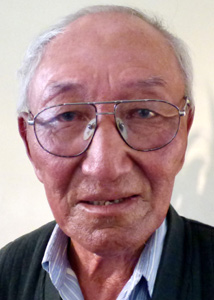Name: Ata
(Alias: No)
Gender: Male
Interview Age: 78
Date of Birth: 1937
Birthplace: Meshay - Derge, Kham, Tibet
Year Left Tibet: 1959
Profession: Farming, Herding
Monk/Nun: No
Political Prisoner: Yes

Interview No.: 3N
Date: 2015-04-08
Language: Tibetan
Location: Kathmandu, Bagmati, Nepal
Categories: Resistance and Revolution
Keywords: Chinese -- first appearance of, Chinese -- oppression under, Chushi Gangdrug guerrillas, commune system, escape experiences, forced labor, guerrillas in Mustang, imprisonment, Kham, thamzing/struggle sessions
Summary:
Ata was born into a middle class family living in Derge, Kham Province. He describes his parents as samadok--engaged in both farming and rearing animals such as yaks, dri 'female yaks' and dzomo 'female animal bred from a yak and a cow.' They grew wheat, barley and peas, and the barter system was prevalent with the exchange of grains for meat and butter.
Ata talks about the Reformation during which the Chinese confiscated people's property and redistributed it as well as established the kongri 'commune system.' Families were categorized as wealthy, middle class and poor and the Chinese imposed the "liberation" of Tibet against the wishes of the people. He witnessed the Chinese subjecting people to thamzing 'struggle sessions,' beating and imprisoning them. Ata tells how the people revolted against them and many escaped to Lhasa.
Ata left for Lhasa in 1958 and joined the Chushi Gangdrug Defend Tibet Volunteer Force. He describes the guerrilla tactics they engaged in and the types of weapons they used. The guerrillas were outnumbered by the Chinese so they tried to escape. Ata was arrested and endured hard labor in prison until he escaped. He again joined the Chushi Gangdrug which had regrouped in Mustang, Nepal. He remained for 13 years, crossing back into Tibet many times to ambush the Chinese.
Interview Team:
- Tenzin Yangchen (Interpreter)
- Katharine Davies Samway (Interviewer)
- Henry Tenenbaum (Videographer)

